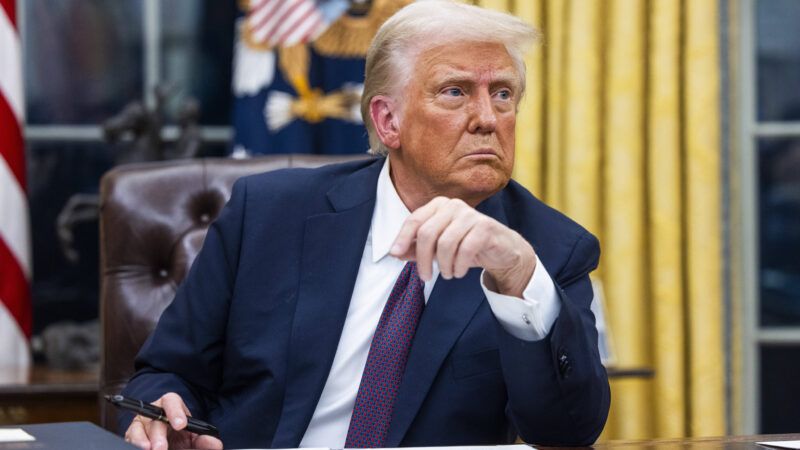Disinformation Experts Hate Trump's Free Speech Executive Order
As expected.

Newly inaugurated President Donald Trump signed a bevy of executive orders earlier this week, including one that seeks to end the federal government's pressure campaign on social media companies.
The "Restoring Freedom of Speech and Ending Federal Censorship" executive order reaffirms the free speech rights of social media users and prohibits government agents from engaging in unconstitutional censorship.
You are reading Free Media from Robby Soave and Reason. Get more of Robby's on-the-media, disinformation, and free speech coverage.
"Under the guise of combatting 'misinformation,' 'disinformation,' and 'malinformation,' the Federal Government infringed on the constitutionally protected speech rights of American citizens across the United States in a manner that advanced the Government's preferred narrative about significant matters of public debate," states the order. "Government censorship of speech is intolerable in a free society."
This order is, as the Abundance Institute's Neil Chilson recognized, "good and appropriate." Much of the censorship on social media sites that rightly irked libertarians, conservatives, and dissidents of all stripes was not enforced by the platforms of their own free will; on the contrary, they were browbeaten by various federal agencies, including the Department of Homeland Security (DHS), the Centers for Disease Control and Prevention (CDC), and the White House.
It's right and proper for Trump to tell the bureaucrats who work at these agencies: that's enough of that. The First Amendment protects misinformation and hate speech, and the feds have no business policing these categories of speech on social media.
Needless to say, self-described disinformation experts hate this order—and mainstream media organizations are always happy to provide a megaphone to their complaints. CNN saw fit to enlist Nina Jankowicz, the discredited former DHS disinfo adviser, to offer a thunderous denunciation.
"Disinformation is not a partisan issue; it's a democracy issue," Jankowicz said in a statement. "America's adversaries benefit when our country is internally divided and politically polarized."
On the contrary, internal division and even polarization are the blessings of liberty. Americans disagree strongly on what policies are best for the nation, and we exercise our free speech rights to vigorously debate. Free speech is pro-democracy; America's adversaries—countries like China and Russia—on the other hand, crack down on free speech and eliminate internal dissent wherever possible.
Another expert cited by CNN fretted that the order would get in the way of vital communication between government actors and platforms.
"The vast majority of tech-government contact is not around political speech but is around areas of national security and fighting financial fraud and child sexual abuse material," John Wihbey, an associate professor of media innovation and technology at Northeastern University, told CNN.
Wihbey, unlike Jankowicz, has a point: There are legitimate reasons for law enforcement, for instance, to interact with social media companies for the purposes of flagging, investigating, and removing child sexual abuse material, threats of violence, and terrorism. Since those categories of behavior already fall outside the scope of First Amendment–protected activity, however, efforts to police them are not imperiled by the executive order.
Government actors can and should work with social media companies to identify crime, violence, and sexual abuse—and take that content down. But the feds cannot and should not weaponize vague "national security" objections and pressure private companies to comply with unconstitutional dictates.
The next step is for Congress to codify this order into law. With a Republican-controlled Senate and House of Representatives, lawmakers could take powerful action to safeguard the free expression rights of social media users—even if that makes Jankowicz really sad.
This Week on Free Media
I'm joined by Amber Duke to discuss the Nazi salute allegation against Elon Musk, other Trump executive orders, the outrageous preemptive pardoning of Anthony Fauci, and more.
Worth Watching
I have just started the next season of Marvel's What If…? and I am underwhelmed so far. But I'm a completionist, so I'll still finish it. After that, I'll be watching either Dune: Prophecy or Severance.


Show Comments (90)